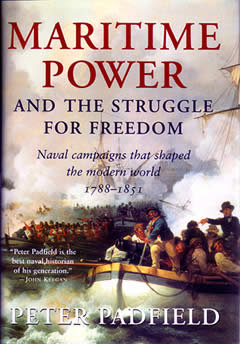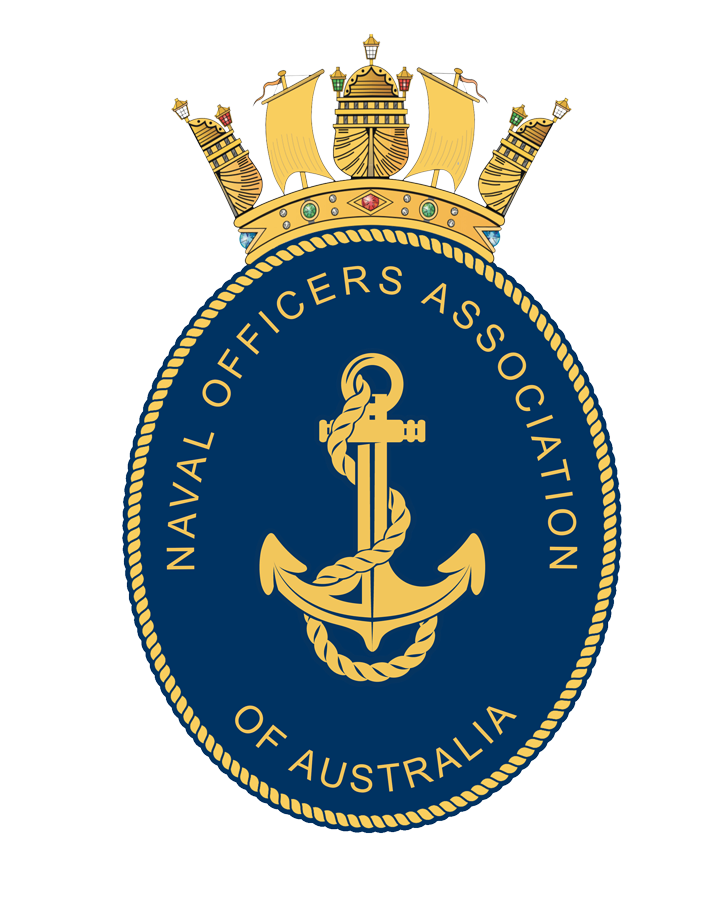
Sea Power: 1788 – 1851
Book review by Fred Lane
Padfield, Peter. Maritime power and the struggle for freedom: Naval campaigns that shaped the modern world 1788-1851. The Overlook Press: Woodstock, 2005. 467 pages including a comprehensive index, glossary, 16 pages of illustrations and another nine pages of maps. RRP is US$35, but unmarked used books are available on the internet for about AUS$20 plus $7 or so postage.
This great Christmas present book follows Maritime supremacy and the opening of the Western Mind: Naval campaigns that shaped the modern world 1588-1782, by the same author. It covers a vital period when Royal Navy ships, led by officers such as Jervis and Nelson, established a maritime supremacy that permitted trade expansion and colonisation on scales that had never before been contemplated.
Padfield also discusses the bucket of cold water administered by the USA in 1812-13. Importantly, he describes the last days of naval warfare before steam and iron trashed the rules. He explains how Jack Tars, in wooden sailing ships at the pinnacle of their development cycle, fought battles that led to the destruction of entrenched geopolitical ideologies.
Correlated with a Europe-wide struggle to define and govern an emerging “freedom of the masses”, Padfield shows how the Royal Navy and a British civilian population of about 20 million radically reshaped society in a little over 50 years.
Youngsters interested in only the blood and guts of battle might find Padfield’s sociopolitical arguments a little long-winded as he reprises the theoretical concepts of Sociology 101’s “usual suspects”. Nevertheless, this is an essential prerequisite and there is enough blood and guts to satisfy even the most bloodthirsty. All the important sea battles are there, including a thrilling virtual shot-by-shot report of Howe’s 1794 Glorious First of June. “Howe had shown the way,” Padfield asserts. “Within a few years Nelson would follow and lift naval warfare to greater heights of daring and destructiveness” (p. 103).
In the contexts of their respective officer corps, Padfield cleverly analyses the socioeconomic development and promotion of major personalities, like Napoleon and Nelson. Both were “… of small height and slight build … who had raised (themselves) through similar extraordinary ambition, flare (sic) and audacity to heroic status” (p 129). With equal dexterity and attention to detail he shows how British superiority in gunnery, seamanship, signalling and fleet tactics determined battles.
Geopolitical movements
Padfield illustrates how maritime supremacy shaped crucial geopolitical movements. He acknowledges the devastating land warfare clashes, but correctly points out that these armies were financed by nations. His bottom line: It was the maritime nations that controlled trade, therefore they had the deeper pockets and won the final battles.
How was this fiscal success achieved? As Padfield asserts, all the warring nations were deeply in debt but after Jervis’s singular 1797 St Vincent success, “News of the victory restored British government credit practically at a stroke. It was more than ever clear that, however many ships her enemies might bring against her, they would be no match for British fleets” (p 128). Of course, had Nelson not broken from the British line without orders and acted on his own initiative, capturing two much larger ships than his own, and had Collingwood not come to his old gunroom messmate’s assistance, St Vincent might well have had a vastly different outcome.
Napoleon commanded an army ostensibly to invade England in 1798, but he had broader aims. He saw the impossibility of achieving his primary task without first destroying the Royal Navy, but first his country’s crippled treasury needed money. He looted the Vatican’s coffers, then Switzerland’s. Then he stripped the money vaults of the wealthy Knights Templar of Malta on his way to invading Egypt. There, he planned to interdict Britain’s access to India and other Asian trading nations.
Underestimated RN
Napoleon underestimated the Royal Navy and Nelson who, at Aboukir, inflicted “… the worst ever French defeat and unprecedented in naval history. Strategically it was decisive. France had lost control of the Mediterranean. Bonaparte’s army was imprisoned in Egypt … “(p 166).
Trafalgar in 1805 was the last, biggest and most decisive major battle under sail. It was an overwhelming victory for Nelson, but also a tragedy. The nation at once rejoiced in the victory and mourned their gallant hero’s death.
These and other Royal Navy victories changed the world. Britain’s subsequent buoyant economy was based on unparalleled growth of colonial trade protected by a strong navy. This commerce supported the development of a truly accountable democratic government system that led to advances such as the abolition of slavery. All this shaped the “freedom” that we take for granted.
